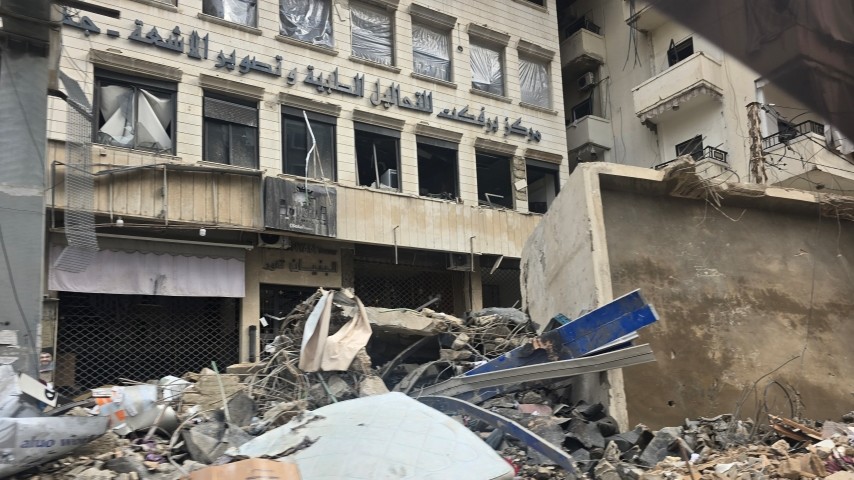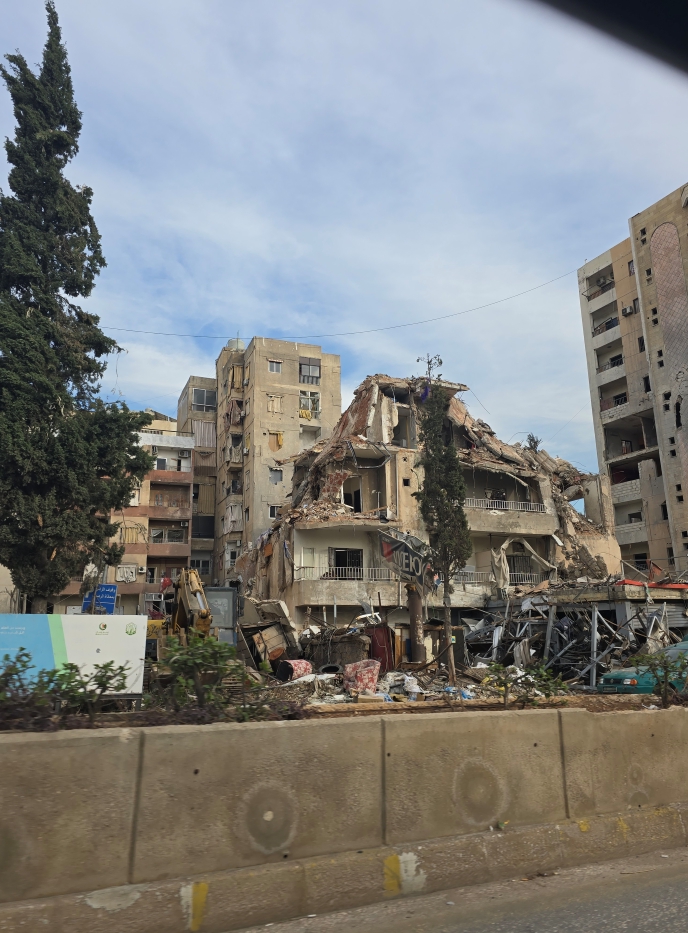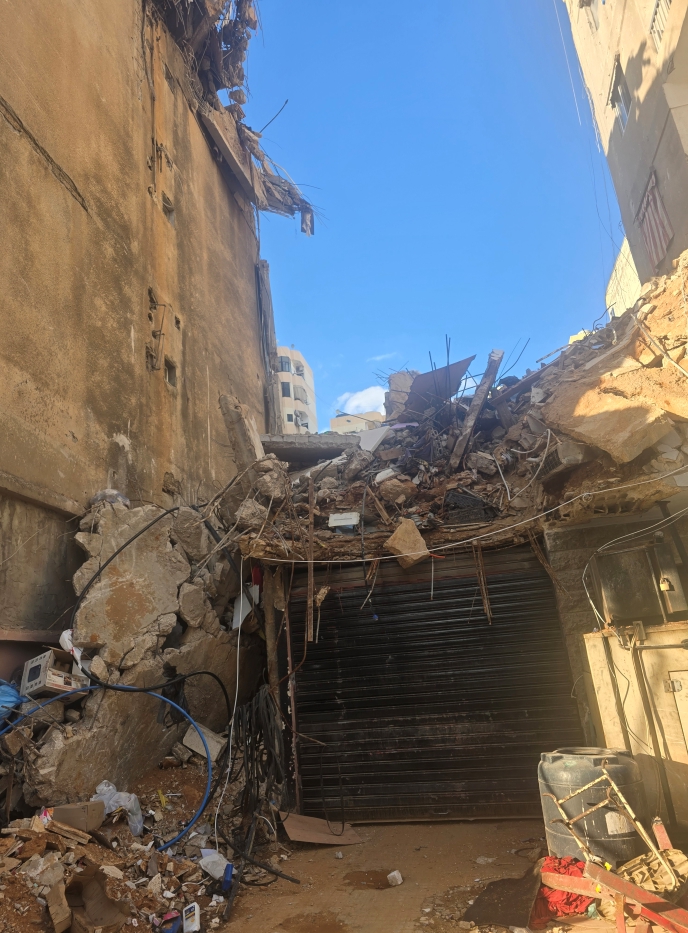Beirut Demonstrates Its Resilience in the Face of Relentless Israeli Attacks
Photo by Roqayah Chamseddine
BEIRUT — Across Beirut’s southern suburb, the Chiyeh, and throughout South Lebanon the people have begun their journey back to their neighborhoods, in the shadow of a ceasefire that has so far been violated by drone surveillance and brutal Israeli attacks against South Lebanon, which have included the killing of a family from the village of Haris on December 5—an assault that took that lives of 6, including one child. Israel’s ceasefire violations have now surpassed 130, and many Lebanese citizens across the country are unconvinced that the ceasefire will hold, especially as Israel has never truly been held to account for violating the nation’s sovereignty. United Nations experts released a statement in October condemning Israel, saying “The number of internally displaced persons in Lebanon has more than tripled in less than a month due to Israel’s relentless attacks on populated areas coupled with belated or ineffective evacuation orders, in violation of the principles of distinction and proportionality.” The full extent of the destruction across the southern suburb is still being reckoned with, and efforts by local municipalities to clean up the streets and rebuild are now underway, but it’s clear that this will be a long process, and the aftereffects will be felt for years to come.

Photo by Roqayah Chamseddine
The Dahye, or Southern suburb, is a ghost of its former self—moving across its streets is like passing through a disturbed war of elements; fallen buildings, craters, and massive piles of debris that still emit the putrid scent of U.S. weaponry. “I have a headache every time I leave the house,” a local repairman in Haret Hreik told me. “I wear a mask, but it doesn’t help, especially when I’m around any of the collapsed buildings. I worry about the impact on my children, especially because they’ve started to clean up the neighborhoods and the dust and litter is ending up in the air we’re breathing. We don’t know what they used on us, but whatever it is, it’s ending up in our airways and lungs. It’s poison.”

Photo by Roqayah Chamseddine
In a statement released by The Syndicate of Chemists in Lebanon (SLC), the organization contended that Israel has used internationally banned weapons across the Dahye, and “the extent of destruction and the penetration of buildings and ground by dozens of metres is evidence of the use of bombs containing depleted uranium, which has tremendous penetrating power.” According to the SLC, these weapons have led to “massive destruction, and their dust causes many diseases, especially when inhaled.”
The site of the assassination of Sayyed Hassan Nasrallah, former Secretary General of Hezbollah, is arguably the most jarring example of Israel’s aggression against the Dahye—the deep crater left behind by the 2000 pound U.S.-made bunker busters, which leveled multiple high-rise buildings in September, is surrounded by twisted metal, charred vehicles, and piles of dirt left by first responders who had been searching for anyone still missing after the Israeli strike. The site is now a kind of memorial, visited by people from around the country who come to pay their respects to those killed in the attack. One woman, wearing a cross, left the site wiping away tears and clutching her chest.
Inside Rawdat al-Shahidain memorial in Ghobeiry, the graves of Hezbollah fighters are covered in flowers, letters, and passages from the Qur’an. On a daily basis, hundreds come to pray over their loved ones. Upon entering the site there sat a grieving mother, supplicating over her son’s grave, his photograph held in her hands—the cement was still fresh. The streets are still cordoned off, with men securing the area and guiding traffic and locals who are passing through, each one greeting you with “welcome home.”
Life continues in the Dahye, but there is an inescapable sense of mourning over what’s happened to the suburb, and one cannot help but feel overwhelmed by the devastation. “I’m sad,” 23-year-old Zainab, a university student tells me. “I was displaced with my family and just came back to the Dahye and few weeks ago, and I’m sad about what’s happened to the area. We came back because we can’t leave. This is home and it will always be home, no matter what the Israelis do to us. Every building could have fallen, and we’d still come back. We’re going to rebuild the suburb, all of us, together.”
In the Chiyeh, an area older than the Dahye, an Israeli airstrike took out local buildings, destroyed shops, and impacted a Hussainiya, but weeks later there were already clean-up efforts underway. The local baker and his family as well as the neighborhood’s corner store, Al Sultan, are back to work, and residents have flocked back to their homes, eager to move forward despite the enormous challenges that lay ahead. Abu Samih, a mechanic in the area, had his entire shop destroyed, and the nearby cafe, Al Hayba, is permanently closed after the airstrikes. Not even the local cemetery was spared from Israel’s unchecked aggression, which impacted the site and neighboring businesses.
“What can we do?” one woman told me. “You either let Israel and the United States decide how you continue with your life, or you pick up the pieces and keep going, and we’ve chosen to keep going. We’re patient, and we know that we will be victorious in the end. Look at Gaza. Even now, they’re resisting. Even now, they’re fighting back. We’re no different.”